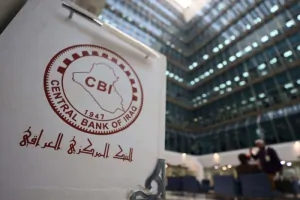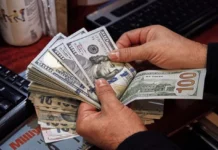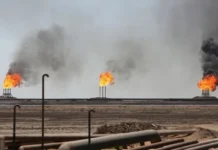Baghdad – In the context of closing the gaps that allow hard cash to seep into the black market or be smuggled overseas, the Central Bank of Iraq said that it will implement a unique system for selling dollars to guarantee that they only go to actual passengers.
The government and the Central Bank “give high priority to the issue of electronic payment because of its important economic repercussions and raising the level of transactions away from excessive use of cash,” Bank Governor Ali Al-Alaq stated to the official last Tuesday.
The timing of the new mechanism’s introduction was not specified by Al-Alaq, but he did clarify that the Iraqi economy is exceptional and that the electronic payment system seeks to drastically lower the economic importance of cash.
He emphasized that in addition to the government’s approval of a number of “important” decisions that facilitate this process and spare citizens from having to pay the resulting commissions, the authorities have made significant progress in setting up electronic payment at the level of collection and payment in state institutions.
In an effort to reduce the abuse of cash reserves in financial crimes and circumvent US sanctions on Iran, Iraq outlawed cash withdrawals and transactions in US dollars from the start of 2024.
Before they leave, Iraqis can take out cash in dollars, but analysts say this has led to a new issue.
Many tourists using bank cards that they used to withdraw thousands of dollars from overseas at the official rate and then resell them within Iraq at the black market price have been caught by police at the nation’s airports in recent months.
Alongside the escalation of campaigns to keep an eye on the exorbitant costs of food and medicine in Baghdad’s local markets, the authorities restricted the exchange of dollars to the Central Bank and authorized banking offices. These efforts were carried out in tandem with commercial control departments and intelligence services.
As part of efforts to lessen fraud, money laundering, and other criminal uses of US cash, eight local commercial banks were barred from dealing in dollars, as was decided a few days before to the announcement.
Al-Huda, Al-Janoub Islamic for Investment and Finance, Al-Arabiya Islamic, Kurdistan International Islamic for Investment and Development, Al-Ittihad Al-Iraqi, Ashur International for Investment and Iraqi Investment, and Hammurabi Commercial are among the banks that are prohibited.
These banks will not be allowed to take part in the Central Bank’s daily dollar auction as a result of the ruling. The nation that depends on imports gets its hard cash mostly from the auction.
As part of a larger operation in July, the authorities stopped 14 banks from doing dollar transactions. The goal was to stop dollars from being smuggled into Iran at the time through the Iraqi banking system. According to American and Iraqi authorities, the decision was made in response to a request from Washington.
Ashur International for Investment and Iraqi Investment, the Iraqi Union, Al-Huda, Al-Janoub Islamic for Investment and Finance, Al-Arabiya Islamic, Hammurabi Commercial, and Kurdistan Islamic International for Investment and Development are among the banks that are prohibited.
According to the central bank, banks that are prohibited from dealing in dollars are nonetheless permitted to operate and carry out transactions in other currencies. The American strategy to decrease money smuggling to Iran now centers on Iraq.
With more than $100 billion in US reserves, Iraq is a unique friend of both Washington and Tehran. It is highly dependent on Washington’s goodwill to guarantee that its access to oil income and financial resources is not impeded.
Al-Alaq claims that many reluctant merchants entered the official platform the Central Bank built to sell foreign money because of the Central Bank’s devotion to the norms and principles of external transfer in line with the criteria and requirements it set and its insistence on following them.
He emphasized that traders can use the dollar at the official rate and that the platform is simple, safe, and easy to use. He also stated that the bank can fulfill any kind of request for dollars, whether it be commercial or personal, as long as it is legitimate and valid, and that the size of the foreign reserve firmly supports these requests.
He emphasized that the Central Bank has no issues offering or selling the dollar, that it imposes no limitations on sales activities, and that it has never set a maximum or minimum amount for any importer, merchant, or user of the dollar, nor has it ever specified for any bank the value of its purchases of the American currency.
“This conveyed the idea that there is no issue meeting demand for the dollar and that speculation is pointless because the rules governing it are inaccurate and unavailable,” he stated. “Some groups are still attempting, from time to time, to avoid the platform for different reasons, such as evading taxes, customs, etc., or because of illegal trade,” he continued.





